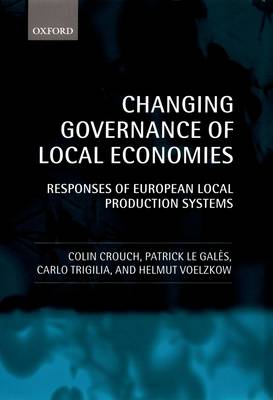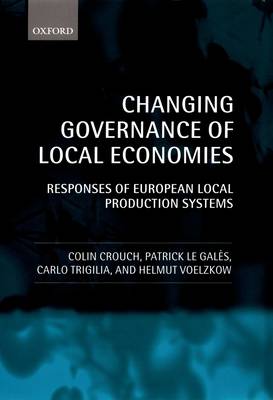
- Afhalen na 1 uur in een winkel met voorraad
- Gratis thuislevering in België vanaf € 30
- Ruim aanbod met 7 miljoen producten
- Afhalen na 1 uur in een winkel met voorraad
- Gratis thuislevering in België vanaf € 30
- Ruim aanbod met 7 miljoen producten
Zoeken
Changing Governance of Local Economies
Responses of European Local Production Systems
Patrick Le Gales, Carlo Trigilia, Patrick Le Gals
Hardcover | Engels
€ 151,45
+ 302 punten
Omschrijving
This book examines patterns of economic governance in three specific, contrasting, contexts: machinery-producing districts; declining steel cities; and clusters of high-technology activities. Building on the work of their previous book (Local Production Systems in Europe: Rise or Demise? OUP 2001), which charted the recent development of local clusters of specialized manufacturing among small and medium-sized enterprises (SMEs) in France, Germany, Italy and the United Kingdom, the authors find patterns of economic governance far more complex and dynamic that usually described in a literature which insists on identifying simple national approaches. The machinery industries were often identifie in the literature of the 1980s as prominent cases of industrial district formation, which were then considerably weakened by the crises of the mid-1990's. Did clustering help these industries and their associated districts to respond to challenge, or only weaken them further? The case studies focus on the Bologna and Modena area of Emilia-Romagna, Stuttgart in Baden-Wurttemberg, Birmingham and Coventry in the English went midlands, but generally in France where there are very few local concentrations. Even while some thought local production systems were in crisis, national governments and the European Commission continued to recommend their approach to areas experiencing economic decline. This was particularily the case for cities that had been dependent on a small number of large corporations in industries that would no longer be major employers. Political and business leaders in these areas were encouraged to diversify, in particular therough SMEs. Could this be done in response to external prssure, given that successful local production systems depend on endogenous vitality? The authors ask these questions of former steel-producing cities St. Etienne, Duisburg, Piombino, and Sheffield. The idea that local production systems had had their day was challenged by clear evidence of clustering among SMEs in a number of flourishing high-tech industries in parts of the USA and Western Europe. Why do scientists, other specialists by examining the software firms at Grenoble, the mass media cluster in Cologne, the information technology sector around Pisa, and the Oxfordshire biotechnology region.
Specificaties
Betrokkenen
- Auteur(s):
- Uitgeverij:
Inhoud
- Aantal bladzijden:
- 392
- Taal:
- Engels
Eigenschappen
- Productcode (EAN):
- 9780199259403
- Verschijningsdatum:
- 6/05/2004
- Uitvoering:
- Hardcover
- Formaat:
- Genaaid
- Afmetingen:
- 156 mm x 234 mm
- Gewicht:
- 721 g

Alleen bij Standaard Boekhandel
+ 302 punten op je klantenkaart van Standaard Boekhandel
Beoordelingen
We publiceren alleen reviews die voldoen aan de voorwaarden voor reviews. Bekijk onze voorwaarden voor reviews.








